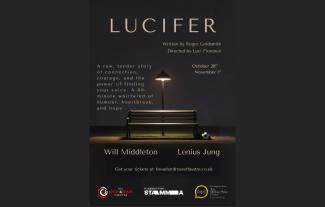Play review: Lucifer

James Whitehurst reviews Lucifer, an autobiographical play written by Roger Goldsmith and directed by Luci Florence, all about a man who loses his job because he stammers, which has just ended a short run in London.
Lucifer at the Bread & Roses Theatre in Clapham, London, provided a raw representation of living with a stammer in 1985. One hopes that the world has changed in the 40 years since this production is set. Lucifer follows Tom, played by Will Middleton, a father who lost his job following a presentation at work. Throughout the play, we see Tom's relationship with his son Billy, played by Lenius Jung, develop as Tom navigates the emotions and internalised feeling of losing his job due to his stammer.
To reflect on my preconceptions before going to watch this production, I naturally thought back to how stammering has been presented through film. We have seen two portrayals of stammering. At one end, we have The King's Speech (2010), where stammering is seen as something to be 'fixed', and the success of controlling disfluent speech. At the other end, we have projections of failure, deviance and even criminality. The example of Professor Quirrell from Harry Potter and the Philosopher's Stone springs to mind. The quote that lingers with me is "Who would suspect p-p-poor st-stuttering P-Professor Quirrell?" (Rowling, 1998, p209). Not very inclusive, I know!
The internalised emotion and feelings that stammering brings in everyday life really came through.
What I enjoyed about the representation of stammering in Lucifer was that it was simply that: a very respectful portrayal of stammering where, yes, the actors stammered, yet it was not forced and portrayed as 'wrong' when Tom was talking to Billy. I feel that if the actors stammered more it could run the risk of coming across as fake, reinforcing past narratives such as Porky Pig, where stammering was seen as a joke for the audience. Although this play is about stammering, I enjoyed that it wasn't the total focus of the story. The internalised emotion and feelings that stammering brings in everyday life really came through. This is often neglected in past portrayals of stammering, having the total focus on the speech itself, when we all know stammering is much more than this.

Throughout the production, we saw Tom (the father) provide monologues of his feelings and reflection of certain interactions. I thought these were powerful at showing the audience what stammering feels like and the thoughts that we have about our stammer, yet no one else sees. Reflecting on this, I thought there could have been more monologues from Tom. They gave a real insight for those who have never experienced stammering before.
The relationship between Tom and Billy was brilliant. Billy saw his dad as just him, and it was very good at showing that the person is more than their voice. Billy embraced his father's difference, changing the expected reaction when fluent speakers see stammering. This was brilliant, as those who stammer are more than just their speech, which unfortunately is still seen in many portrayals of stammering.
Reflections
In the final section of this review, I would like to provide reflections from my own viewpoint as someone who stammers openly. Now, I do not want to be overly critical, but I felt that at times the historical stereotypes of stammering came across. I note this from when Tom talks about his fear of talking to girls and fear of relationships. I know this is the writer's personal experience and viewpoint, yet I think it only reinforces the stereotype that disfluent speakers cannot do things. To change the narrative around stammering in media and plays such as this, I feel there is a need to change how stammering is presented and how it is viewed by those who have no experience of stammering in their everyday life.
Terminology around stammering is important here. For many, stammering is not something that gets 'better' and 'worse'. At times it came across that Tom's stammer disappeared in 'safe' spaces. Yes, for some people, stammering can be prominent in certain situations and less so in others, but that's not the case for everyone. For others, stammering doesn't change in different situations, even in 'safe' spaces. Although it reflected Tom's experience, I'd worry that the audience came away thinking that stammering goes away if the environment and space is 'inclusive' to disfluent speech.
Overall, Lucifer is a sound representation of navigating everyday life with a stammer, the internalised emotional monologues, as well as the challenges of work, home and social life that everyone faces but can be heightened for those who stammer. The play did not go down stereotypical rabbit holes of negative representation of stammering that we have seen for so many years. There is real progress in representing stammering here and I hope we see Lucifer go on tour soon.
Lucifer was on at the Bread & Roses Theatre from 28th October to 1st November 2025. If the play tours, we'll let supporters know in our newsletter. Join our mailing list or become a STAMMA member for free so we can keep you informed.
Read the story behind the play, by playwright Roger Goldsmith.

































